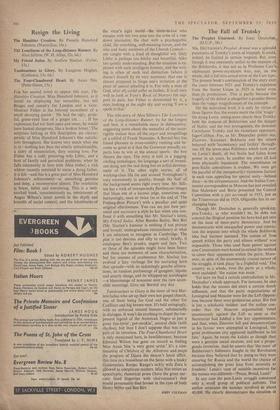Resign the Living
The Humbler Creation. By Pamela Hansford Johnson. (Macmillan, 16s.) Tambourines to Glory. By Langston Hughes. (Gollancz, 13s. 6d.) The Four-Chambered Heart. By Anais Nin. (Peter Owen, 15s.) Foa her second novel to appear this year, The Humbler Creation, Miss Hansford Johnson, as if intent on displaying her versatility, has left Bruges and rascalry for London and a vicar. Maurice Fisher is the belove,c1 incumbent of a small decaying parish : 'He had the ugly, pride- ful, green-eyed face of a ginger cat. . . . If his expression had not been open and sweet, he would have looked dangerous, like a broken boxer.' The surprises lurking in this description are charac- teristic of Miss Hansford Johnson's fine calcula- tion throughout. She knows very much what she is at—nothing less than the utterly unfashionable, a story of renunciation, duty ousting love. For Fisher has a cold, posturing wife Libby, and a host of family and parochial problems; when he falls reluctantly in love with Alice Imber; a rich widow recently returned to nurse a dying father, it is felt—and this is a great part of Miss Hansford Johnson's achievement—as something genuine and deep, a reconversion almost. The resolution is brave, bitter and -convincing. This is a well- Stocked book, conscientiously so, reminiscent of Angus Wilson's latest novels in the depth and breadth of social context; and the inhabitants of the vicar's tight world—the sister-in-law who escapes with her two sons into the arms of a run- down journalist, the char with a psychopathic child, the stumbling, well-meaning curate, and the nice and nasty members of the Church Council— are caught with a kind of thoughtful wit. Only Libby is perhaps too bitchy and beautiful, Alice too quietly understanding. But the situation is ex- plored with such intelligent honesty, and the writ- ing is often of such real distinction (where it doesn't disturb by its very neatness), that one is almost prepared to forgo one's irritation at the piece of special pleading it is. For only a man of God, after all, could suffer so futilely. It is all very well to look at Foxe's Book of Martyrs for sup- port in pain, but Fisher is diminished by it, a man looking at the night sky and saying l am a
speck to that.' •
The title-story of Alan Sillitoe's The Loneliness of the Long-distance Runner, by far the longest and best, is a remarkable essay in delinquency, suggesting more about the mentality of the incor- rigible outlaw than all the argot and misspellings of a cellful of Frank Normans. A Borstal boy has found pleasure in cross-country running and be- come so good at it that the Governor proudly ex- pects him to win at the annual sports : the boy throws the race. The story is told in a jogging, circling monologue, the language a sort of ironed- out slang, not the real thing but an artful develop- ment of it. The other eight stories, all of working-class life (in and around Nottingham?), vary enormously in quality, though the 'feel' of the background seems right every time. Mr. Silli- toe has a trick of unexpectedly flamboyant images that blaze out of a laconic age, sometimes em- barrassingly, once or twice (as at the end of 'The Fishing-Boat Picture') with a peculiar and quite original effectiveness. You can see just how per- sonal and necessary a style he has when you con- front it with something like Mr. Sinclair's latest, My Friend Judas. After Bumbo Bailey, Ben Birt (Mr. Sinclair's humour is nothing if not private and broad); undergraduate extraordinary at what I am reluctant to recognise as Cambridge. The plot is too devious and silly to retail; briefly, it catalogues Ben's pranks, angsts and lays. Two or three of the episodes might have been funny and there are moments of sane characterisation, but for reasons of exuberance Mr. Sinclair has evolved a lazy verbiage for his narrating hero that spreads—with its sickeningly gauche allitera- tions, its random .purloinings of gangster, hipster and smarty slangs, and its whipped-up scatologies —a blancmange of nonsense over the rare acces- sible meanings. Give me Borstal any day.
Tambourines to Glory is the story of two Har- lem ladies who set up their own hot gospel church, one of them being for God and the other for Cadillacs and big brown men. It's told swingingly, with an unforced natural humour, substantially in dialogue. It won't do anything to dispel the too- present legend of the American Negro as just a great fun-lovin', pot-smokin', amoral Chile (with rhythm), but then I don't suppose that was ever part of its intention. The Four-Chambered Heart is only mentioned here, in bewilderment, because Edmund Wilson has gone on record as finding Miss Anais Nin 'a very great artist.' It's a con- tinuation of Children of the Albatross and maps the progress of Djuna the dancer's latest affair, this time in a houseboat on the Seine with a husky Guatemalan, Rango. Rango's sickly wife Zora is allowed to complicate matters. Miss Nin writes an apocalyptic, rhetorical prose Clove the great nar- cotic lined fingertips with clairvoyance') that would presumably find favour in the eyes of both Henry Miller and Ben Birt.
JOHN COLEMAN


































 Previous page
Previous page